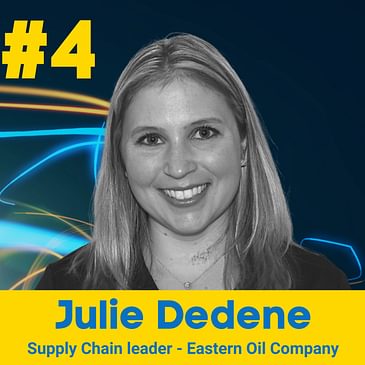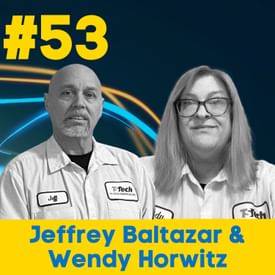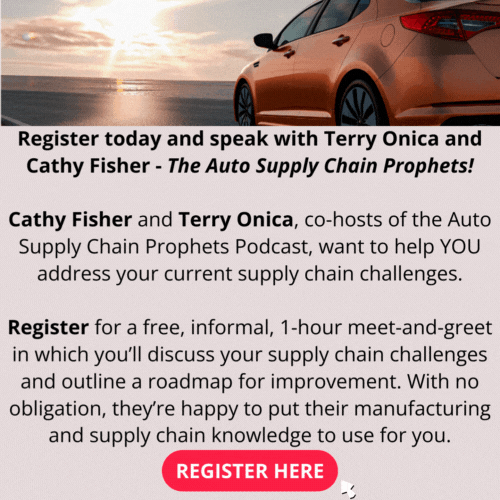It’s a good thing Julie Dedene likes to think on her feet. In her role as a supply chain manager for industrial lubrication supplier Eastern Oil Company, she’s had to contend with everything from the COVID shutdown to a demand spike, labor shortages, and natural disasters.
Julie describes her job as “a constant battle,” but as someone who loves a good puzzle and solving problems in real-time, she’s in her element.
Themes discussed in this episode:
- How Julie "fell" into a career in supply chain after working in human resources
- The importance of continuous communication with suppliers and customers
- How to attract Millennials to the supply chain industry
- Why having multiple suppliers is critical in an emergency
- The need for supply chain leaders to open their minds to alternative products
Featured Guest:
Name: Julie Dedene
Title: Supply Chain Manager at Eastern Oil Company
What she does: Julie began steadily working her way up the supply chain ladder at Pontiac, Michigan-based Eastern Oil Company when she was hired in 2015 as a purchaser. Today, she manages the organization’s supply chain.
Connect: LinkedIn
Episode Highlights
Timestamped inflection points from the show
[1:17] A false start: After realizing human resources wasn’t for her, Julie joined Eastern Oil Company as a buyer and began her career in supply chain.
[2:02] Never a dull moment: Since 2020, Julie and her team have dealt with a number of challenges. COVID, a demand spike, labor shortages, and bottlenecks created what Julie describes as “a huge trickle-down effect.”
[2:28] The perfect storm: In 2021, fires at multiple oil and chemical facilities in several states and a winter storm in Houston seriously affected the industry's ability to meet demand and do business.
[4:16] Check your sources, and make sure there’s more than one: To address unforeseen disruptions, Julie recommends that manufacturers have multiple suppliers, each approved to provide more than one material.
[6:15] Communication is your fail-safe: Amid the instability of the past few years, Julie has found continuous communication with customers and suppliers to be essential in keeping things running as smoothly as possible.
[8:19] Small advantage: Since she doesn’t have to navigate the giant hierarchy of a big corporation, it’s easy for Julie to communicate directly with decision-makers and stakeholders in her organization.
[10:12] Piecing it all together: While working in human resources, Julie realized that she really liked numbers and analysis. Eventually, she made the transition to supply chain.
[12:32] Ground control: The importance of a strong IT system can’t be understated. Julie says this is especially true when multiple sites work together and need to view the same data.
[13:12] The one thing: The auto supply chain industry would benefit from being “more open to alternative products,” Julie says. She stresses the importance of having backup plans to keep things moving, even when the unthinkable happens.
Top quotes
[1:53] “I feel like every day I'm walking into something new. When you think it can't get any worse, somehow it does.”
[3:32] “You always have to think outside the box to make magic happen, and that's what we've been doing for almost two years now.”
[4:16] “One thing I would recommend [manufacturers] do is not be single source or not have just one material approved. Being a small company, we have the flexibility with our lab and management and everybody at our company to [say], Hey, we can't get this. What else can we do? And we figure it out.”
[7:16] “I have to pretty much keep my day open because you don't know what's going to hit. We could get hit with one of my supply chain analysts getting a response from a vendor: We have an issue with this. We can't get this for you. Or we can only get one out of four that you ordered. We're in a very reactionary state right now. Honestly, I love it. I love the puzzle building. I love trying to figure the mess out.”
[10:39] “I really fell in love with all of the analyzing data, figuring out buying patterns, how we should buy products, stocking levels, production schedules, and trying to make the whole … puzzle work so that we can be as efficient as possible. I guess in order to get more people like myself involved, it just comes down to opportunities available. And knowing that supply chain just isn't transportation logistics.”
[13:48] “Have alternative sources for everything, just because you never know what life will throw at you.”
We really can't predict the future because nobody can. What we can do though, is help auto manufacturers recognize, prepare for in profit from whatever comes next. Auto supply chain prophets gives you timely and relevant insights and best practices from industry leaders. It's all about what's happening now in the automotive supply chain and how to prepare your organization for the future. Because the auto supply chain is where the money is.
Jan Griffiths:Hello, and welcome to another episode of auto supply chain prophets. In Episode Two, Terry and Kathy turned the microphone on me. And they made me go down memory lane. And I remember those early days when I was full of excitement and passion and energy for the industry and for supply chain. And today. You're going to meet Julie Dedene, and she has all of that and much more. Julie, welcome to the show.
Julie Dedene:Thank you for having me.
Jan Griffiths:So tell us, Julie, what is your story?
Julie Dedene:Well, I have been with Eastern oil for seven years. I am currently doing supply chain for Eastern oil, I started off as a buyer and then kind of worked my way into my current role of a supply chain manager. Prior to going to Eastern I tried the HR route for a little while. Didn't think that was for me. And yeah, here I am.
Cathy Fisher:Excellent! Julie, we are so interested to find out what are the challenges that you are currently facing as a leader of supply chain at your organization.
Julie Dedene:Oh, man, challenges galore. I feel like every day I'm walking into something new. When you think it can't get any worse somehow it does. But for us, it's all you know, it's been this huge trickle down effect. With COVID, things kind of got shut down, things were really slow. And then as soon as we had this demand spike, probably end of summer, early fall, you know, there are still a lot of COVID restrictions, there are labor shortages. And then from there just the supply was not able to meet demand and it caused a lot of bottlenecks. And then, just things went downhill continuously, you thought it would get better. And then there was a winter storm in Houston in February, and that affected the whole Gulf Coast. And that really impacted the chemical industry. People don't realize how much oil and chemical they use on a daily basis. It's not just fuel for your car. It's yeah, major part of it. But it goes into everything you touch on a daily basis. And that storm hit and that kind of put a lot of things behind even worse than it was because they couldn't keep up with the demand already. And then just kind of go from there, there was a lot of fires within a span of a month period, which affected refinery, there was a chemical plant, there was a grease plant that caught on fire, which is completely burned to the ground, not going to rebuild it. And that trickles down into that business has to go somewhere. And it's going to it kind of has a strain on the grease side of things because there's not a lot of other places that manufacturing. And that's not even a fraction of it, I swear. Like every day something new pops up. And yeah, it's just it's been a battle. It's been a constant battle. And honestly, it's, it's fun in the sense of you always have to think outside of the box to make magic happen. And that's what we've been doing for the past almost two years now.
Terry Onica:How quickly will manufacturers realize these supply chain disruptions? And what are their options for overcoming them?
Terry Onica:I think it really depends on what kind of materials they're buying and what they're using it for. The chemical portion of it, they probably already have been seeing it or have seen it. A lot of like the grease, I think they started to feel the impact of it already. And I think there's just more coming. I mean, you can't there's certain raw materials that are on shortage, like such as strength or sulfurous additives on shortage and that's going to impact them probably soon if they do use those type of materials. One thing I would recommend they do is not be single source or not just have one material approved. For us being a small company, we have the flexibility with our lab and management and everybody at our company to hey, we can't get this. What else can we do and we figure it out. Whereas bigger corporations have that I think a harder time adjusting to having other approved sources and materials to switch out and out if you need to an emergency situation.
Terry Onica:Julie, what tier would you consider yourself? Are you multi? But, talk about what level of the supply chain you're at?
Julie Dedene:We are multi. So we do do some business direct with the OEMs and then we also do supply different tiered suppliers.
Cathy Fisher:Interesting because of the nature of the products that your organization is providing into the automotive supply chain. Could in some cases, perhaps be filling, you know, in terms of filling equipment on the assembly line. But more often from what you've shared with us, it's going to be greases, and lubricants that are used as assembly aids or in ensuring kind of the functioning of smaller parts on the actual vehicle. So Julie, help us understand how your organization is interacting with your customers in the automotive supply chain, in terms of ensuring that they are planning sufficient quantities of the products that greases lubricants that you're providing.
Julie Dedene:We do get forecasts for the most part. But it's hard to know if there's going to be a change in production or not. And I think over the past couple years, it's been really hard to get a good forecast because one day the plant could be running because they got a shipment of semiconductors in or another time, they won't. So there's been a lot of like, I would say, blips where we just get a little bit of a run on a product, which then kind of, we stumble a little bit trying to make sure we meet that demand. But I think just continuous communication with customers and suppliers, whoever they are just telling what's going on with their current production schedule will just make it better for everybody.
Cathy Fisher:So you're finding that most of your customers are providing you with a forecast or not doing spot buys of your material?
Julie Dedene:Not all the time, a lot of it is all based on historic. Sometimes we will get updated forecasts. You know, we'll reach out when we feel like we've seen a little blip and hey, is this gonna continue? Is it you know, is this a one time thing? But a lot of it is based off historic.
Terry Onica:Julie, what is your life like in general, when you come to work with all these disruptions as a supply chain manager? Tell us what your typical day is like. I would love to hear it.
Julie Dedene:Well, every day is very different. Whether it be you know, I come into the office, I can't think about what I'm going to do that day ahead of time. You know, I might have my little list of to do things to get done. But I have to pretty much keep my day open because you don't know what's gonna hit. It could be we could get hit with one of my supply chain analysts getting a response from a vendor, "Hey, we have an issue with this. We can't get this for you." Or, "we can only get one out of four that you ordered." And then you know you just kind of have we're in a very reaction airy state right now which honestly, I love it. I love the puzzle building. I love the trying to figure the mess out. I love, I absolutely love that part of it. Or if it's not, we can't or having trouble getting something that day. It's, "Okay, what price increases do we need to put in today?"
Cathy Fisher:So, what is.. some things I know, You we're talking about really loving the firefighting and it is exciting to me, it's kind of a bit of an adrenaline rush. What are some things that your organization or perhaps even your customers could help your organization with to become more proactive in managing not only this disruptions, but just the day-t-day supply chain?
Julie Dedene:A lot of it just comes down to communication. I think we've talked offline a little bit about how we're a small company. And to me, that's a benefit because we know what every departments doing. I can walk into our lab say, "hey, I need this product, what can you do because I have customers that I need to serve." Where I think it's a little harder in the bigger organizations, just to pick up a phone to call one person I feel like there's a lot of chain of command, which that's how they operate. But I just feel like there needs to be more communication about it.
Jan Griffiths:Julie, you're relentlessly positive. And we all love that about you. What? How? How so? Because you know, what you have? The energy the personality, the mindset that you have people in this industry would love to bottle that and sell it for a crazy amount of money. How? How Julie? Do you go to work every day, knowing that there's a crisis in front of you? You don't know what's coming at you. How do you stay in that positive mindset?
Julie Dedene:I think it just comes with the territory. Like number one, like I love what I do. If I didn't love what I do, I would struggle on a daily basis and I probably would not be here anymore. For the most part is, you have to stay positive. If you don't, it really just ruins your whole mentality. Your whole like, mood your whole, even like physical like you just start just feel always burned out and if you let the situation take over you, it's not going to turn out good for anybody.
Terry Onica:How would you recommend? We get more Julie's. More millennials just like you and to supply chain? I think that's the million dollar question for so many organizations. What do we need to do to attract more people like Julie to the industry,
Julie Dedene:You know, for me, I kind of fell into supply chain, it's not something that I thought I would ever do it ever thought of doing. Like I said, I started out the HR route, I thought that's what I wanted to do. I enjoyed working with people. But then I also really liked the numbers side of it, I liked analyzing things. I liked, I always liked doing Sudoku puzzles and any other type of puzzle when I was younger, so that I always liked figuring things out. Engineering wasn't going to be my thing, I didn't want to do that. But, you know, I walked into an interview for a buyer position in Eastern oil and just kind of snowballed from there. And, you know, I really fell in love with all of the analyzing data, figuring out buying patterns, how we should buy products, you know, stocking levels, production schedule, and trying to make the whole piece of the puzzle work so that we can be efficient as possible. I guess in order to get more people like myself involved, is I guess it just comes down to opportunities available. And knowing that supply chain just isn't transportation logistics, I think when I started and gotten to this role, I just thought supply chain was like freight, and trucking and all of that. It's way more than that. And I think it just this supply chain is kind of newer, this whole concept of it is newer, and it's just more awareness for college kids, really.
Cathy Fisher:Then also helping them recognize that, money is made in the supply chain.
Julie Dedene:Yeah!
Cathy Fisher:That's gonna make it exciting, right?
Julie Dedene:Yes, I know that I love those projects of cost, save and go on all these vendors, hey, I need this kind of against each other. It's great.
Terry Onica:How important in general, do you think to millennials, that having good IT systems is going to be able to attract people like yourself to the industry? How important do you think that is to people in the millennial generation?
Julie Dedene:IT systems is huge. The more it involved and the more data get that can just be given to you at your fingertips, we'll make everything run a lot smoother.
Terry Onica:Do you think your generation almost expects it when they get hired them? They don't want to look at green screens or black screens up there, you know that that is a real driver for them?
Julie Dedene:Oh, yeah. 100%.
Terry Onica:Just how important is it to having good technology?
Julie Dedene:I think having a really good IT system in place, it will help tremendously. Especially when you're working with an organization with multiple sites, it helps keep everybody connected, they can see all the same data. And I think that connection is huge, and can maybe break down some of the silos that companies are currently experiencing.
Jan Griffiths:What's the one thing, Supply Chain Leaders can do today? Right now! To ensure success in the future? So you're speaking to CEOs, supply chain leaders in the automotive industry? This is your chance. If you could change it, what would you change? What advice would you give them?
Julie Dedene:Be more open to alternative products. Whatever you want to call them? Just have contingency plans. It doesn't mean that you have to use that secondary source all the time. But just hey, you want something on the backburner? Because you don't know what can happen. We've all been through the hurricanes that have affected the Gulf Coast before the winter storm. And it doesn't mean it can't happen again. It absolutely can happen again. This act of God situation that can happen anywhere anytime. That the Yeah, the biggest thing is just have alternative sources for everything just because you never know what life will throw out, yeah.
Jan Griffiths:And don't forget the grease, right?
Julie Dedene:Don't forget the grease!
Jan Griffiths:There it is. We have it, advice from Julie Dedene leading supply chain at Eastern oil company. Thank you, Julie, for being with us today.
Julie Dedene:Thank you so much.
Dietrich:Are you ready to find the money in your supply chain? Visit www.autosupplychainprophets.com To learn how or click the link in the show notes below.




